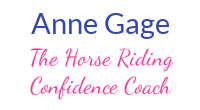Question to “Ask Anne”:
Well, I am in a pickle and not sure which way forward to take. I was not in the market for another horse but Lily got me at “Hello” and especially at this time of year with tracks closing etc. I was worried where she would end up! She is wonderful and has had down time at the stud for 6 months. It’s more me who is the problem in not knowing how to handle a nervous kind of horse. I have had her 3 weeks now, got on her the other day whilst being led, considering so many noises, etc. at the track she is spooky at trees, cushions blowing, soft mud under foot, and of course whilst I was on her back she did a big side jump. Yet the cats & dogs at foot are no problem. No jumping around then; she loves them. Really want to work with this lovely girl. She is so kind. Now that she is not so jumpy with the herd, she has been refusing a little about coming to the barn. Wh en she first arrived she stuck by my side. I did take her into the arena to free lunge a little yesterday and she got extremely anxious wanting to get back into the herd when she saw the lunge line in hand….apparently she did go sour at the track. Not sure where to turn to be honest. You can probably tell I am not very confident and am hoping I have not lost the trust of this mare! Thanks Anne 🙂
P.S. It feels better now I have got it on paper as no one at the barn to talk to about it really.
This is not an uncommon scenario for anyone who has rescued a horse from the race track or similar situation. Generally, I recommend giving former race horses about 6 months just to adjust to their lives away from the track. There are so many adjustments they have to make in their new lives. You don’t mention how old your mare is or how long she was at the track. In North America, it is typical for thoroughbreds to begin their lives at the track as 2 year olds. Chronologically, they may be younger than that since all thoroughbreds are given the unofficial birthday of January 1st in the year they are born. This life entails little if any turn out and no opportunity to socialize with other horses. Her diet would be high in grain, low in fibre (hay) and she would also have regularly been given a variety of drugs and supplements. She has probably had multiple owners and trainers. That is a tough life that does not engender much trust, respect or confidence in anyone or anything.
I recommend focusing on simply building a bond with her over the next few months. All of your interactions with her should be focused on building her trust and confidence in you. This will help resolve her herd separation anxiety. Just imagine that you have lived a life in almost solitary confinement for years and have finally been allowed to socialize with your own kind. You would get stressed at being separated again fearing that you would be put back into isolation. By focusing on bonding with this mare through ground work – grooming, hand walking, lunging, long lining etc. – you can change this dynamic so that she feels as safe with you as she does with her herd mates.
Initally, work with her where she is still close to her herd. Focus on encouraging (but not forcing) her to come into a calm shape – poll level with or below her withers, bending around you and not pushing into your space with any part of her body. Respect her need to move when she is stressed, but control where and how she goes. Just move her around you in a small circle (you remain at her shoulder & push her around you as you pivot on the spot). Keep contact on the lead rope so that you can gently rock her head downwards (don’t pull on the rope but think of creating a massaging action). Gradually expand the distance between your mare & her herd. This might take several sessions, but is well worth the time and effort in the long run. Visit my YouTube Channelhttp://www.youtube.com/user/AnneGage96?feature=mhsn#p/u/3/N4fY9OA6a2A to see a video that shows this technique.
When you adopt an off the track thoroughbred, think of that horse as a foster child who has been passed from home to home. He or she needs time to adjust to the new environment, de-stress physically and mentally, and build trust, respect and confidence in the new situation. The quality of your time with her is more important than the quantity.

